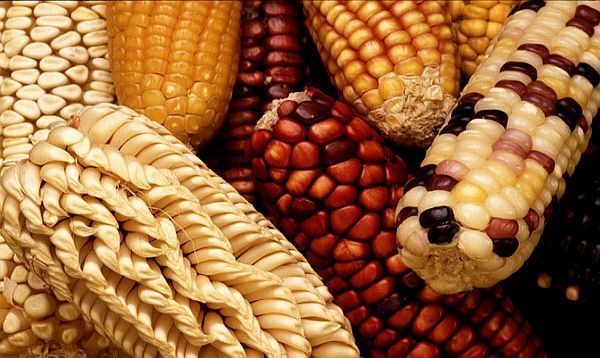After pioneering the cultivation of corn thousands of years ago, Mexico must overcome the weight of history to give the go-ahead to allow genetically modified strains into its fields.
Religion, culture, and science are competing for primacy in the debate on how acceptable corn produced by genetically modified organisms (GMO) is in a country where farmers first domesticated maize about 8,000 years ago.
Last month a federal judge in Mexico City created a stir by ordering a temporary halt to any new GMO corn permits, accepting a lawsuit brought by opponents of the crop. It was widely interpreted as a definitive ban on the commercial use of GMO corn in Mexico, but experts say it will likely just delay any resolution into 2014 or beyond.
With Mexican output falling short of demand, GMO backers are keen to open the door to firms such as Monsanto, which have applications pending to plant over 6 million acres of GMO corn - an area roughly the size of Rwanda.
 |
The agriculture ministry must first finish designating the "centers of origin" where GMO corn farming would be banned, and set other safety regulations before permits can be issued. It must also wait until the legal wrangling has been settled since the federal judge sided with opponents, finding that GMO corn has already been planted illegally in the country.
"It's a very controversial topic," Agriculture Minister Enrique Martinez said recently. "This will have a final resolution that adheres to what the scientists decide."
The science is hotly disputed. Proponents of GMO corn say studies show that production will rise, and costly inputs such as pesticides and fertilizers would fall. They add that GMO crops have proven safe for human consumption.
Opponents, meanwhile, contend that large scale GMO plantings will contaminate native strains and harm biodiversity. They also point to toxins that protect GMO corn against pests that may be linked to elevated insect mortality, which could undermine pollination.
Mariano Ruiz, a deputy agriculture minister in the previous government who backs GMO corn, said the case will likely reach the Supreme Court and cause at least a year's delay.
Although President Enrique Pena Nieto's administration has avoided taking a firm position on its commercial use, Ruiz believes it supports GMO corn. And in his view, there was no question about the legitimacy of large-scale planting.
"There isn't a legal vacuum, there's a delay in the application of the law," he said.
Born of Corn
 |
Despite its humble origins, corn is by far the planet's most produced grain, dwarfing both wheat and rice output. Mexico now plants almost 18 million acres of corn annually to grow mostly white corn, which is used for human consumption, including the country's staple tortillas.
Last year its farmers produced some 21 million tons of corn, or about 3 percent of the global production. But the country consumed roughly 30 million tons, making up the difference with US imports.
Mexico already imports tens of thousands of tons of GMO yellow corn each year, largely for animal feed, and permits planting of other GMO crops, mainly cotton and soybeans. Supporters of GMO corn like Mexico's corn farmers' federation argue it can boost yields by up to 15 percent. Their peers in the United States, Brazil, and Argentina - the world's top three corn exporters - are already producing large quantities of GMO corn.
But the crop has a unique place in Mexico. The 49 landraces of corn, or distinct strains improved over time by traditional methods, and thousands of individual varieties, are often tied to specific indigenous groups and religious ceremonies.
The ancient Maya believed the gods made the first humans out of corn, after rejecting earlier clay and wood forms
"The women and men of corn saw as much as the gods," reads the Popol Vuh, the sacred text of the Maya, who still live in Mexico. "Their glance ranged over the whole world."
Scientists say modern corn comes from teosinte, a wild grain native to southern Mexico.
Legal Limbo
In 2009, during the previous administration of Felipe Calderon, changes to Mexico's bio-safety law allowed biotech crop developers for the first time to experiment with GMO corn trials in approved regions of Mexico. Since then, dozens of pilot permits have tested GMO corn strains for their tolerance to herbicides as well as resistance to insects and drought. But Calderon left office without approving large-scale GMO corn plantings.
Those corn permits could have been approved as early as February, but the change of government led to a delay.
 |
GMO corn backers, like Alejandro Monteagudo of industry lobby AgroBIO, argue Mexico has no reason to fear tinkering with DNA in search of larger yields and hardier plants.
"The government's biosecurity measures are in place to insure that commercial GMO corn plantings are done legally and with no impact on the environment or biodiversity," he said.
But opponents say Monsanto's proprietary seeds essentially privatize corn production and threaten centuries-old farming practices by making farmers buy new GMO seeds rather than harvest them from Mexico's current crops. Unsurprisingly, they applaud the judge's ruling last month.
"This decision is unprecedented," said Aleira Lara, the head of Greenpeace Mexico's sustainable agriculture campaign.
Greenpeace, which is not a party to the case, will immediately file a separate suit if the agriculture ministry approves any permits as the court case proceeds, Lara said.
The extended political and legal fight leaves five applications for commercial-scale GMO corn fields in limbo.
Monsanto has submitted two applications, both of which seek 1.7 million acres for GMO corn in the northwestern state of Sinaloa, the country's largest corn producing area.
The Mexican unit of Pioneer Hi-Bred International, part of DuPont, has three bids, each of which would cover about 900,000 acres in northeastern Tamaulipas state.
Meanwhile, Dow AgroSciences de Mexico, part of Dow Chemical, has one application for almost 100,000 acres in Tamaulipas.
Original Story


